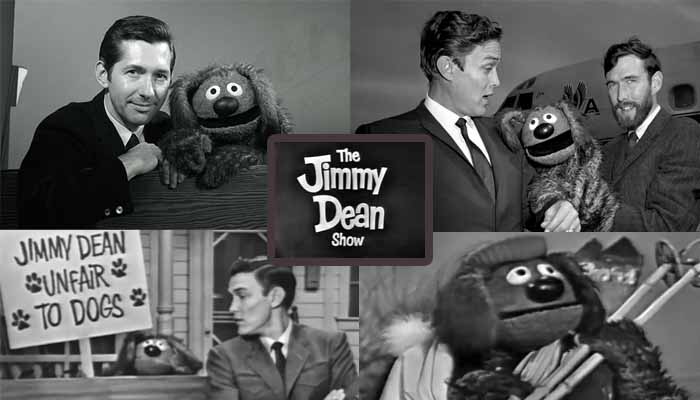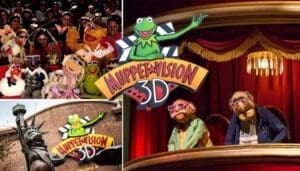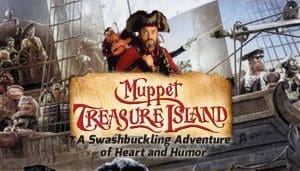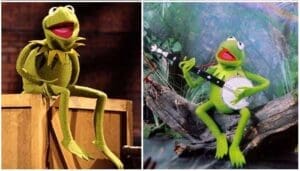Okay, picture this: It’s the early 1960s. Television is hitting its stride, variety shows reign supreme, and country music is two-stepping its way into living rooms across America. One major vehicle for this was The Jimmy Dean Show, premiering on ABC in 1963. Hosted by Jimmy Dean – the smooth country crooner, future sausage magnate, and singer of “Big Bad John” – the show seemed set to follow a familiar format. Standard stuff, right? Absolutely wrong. Because Jimmy’s sidekick wasn’t another singer in a Nudie suit or a comedian telling corn-pone jokes. It was… a dog. A floppy-eared, piano-playing, wisecracking Muppet dog named Rowlf. Yes, a puppet. Before Kermit the Frog was navigating the chaos of The Muppet Show, before Miss Piggy was delivering karate chops to anyone who crossed her, there was Rowlf, holding his own week after week with a country music legend. This is the story of one of the strangest, and most surprisingly wonderful, partnerships in television history.
Wait, a Puppet Sidekick on a Country Show? Seriously?
Running from 1963 to 1966, The Jimmy Dean Show aimed for a “down-home country feel,” yet it achieved surprising popularity “all over the country”. Filmed not in Nashville but in New York City , it clearly tapped into something broader than just the country music fanbase. Perhaps the secret ingredient was its utterly unique element: the Muppet sidekick.
On September 19, 1963, Jim Henson introduced Rowlf the Dog to this national audience. Rowlf wasn’t entirely unknown; he’d previously appeared in commercials hawking Purina Dog Chow, convincing Baskerville the Hound that kibble beat asparagus. But The Jimmy Dean Show was his big break. Initially, Muppets, Inc. was only contracted for the first seven episodes. However, Rowlf, performing “Moon River” in his first week and doing a sketch with Dean the next, became an immediate sensation. He ended up appearing in 85 of the show’s 86 episodes, staying for the entire run until April 1966. This wasn’t just a Muppet appearance; Rowlf became the very first Muppet character to secure a regular spot on a network television series.
What made the show resonate so widely wasn’t just the country charm, which Dean himself reportedly fought to maintain against network pressure to make him seem more “urbane” – a move that boosted ratings. It was the fascinating blend of sensibilities. Here was a variety show, hosted by a country star deliberately cultivating a specific persona, filmed in the metropolitan hub of New York , and featuring a sophisticated, witty puppet capable of playing jazz piano and engaging in clever banter. This unexpected combination seems to have been key. The show offered the comfort of the familiar (country music, variety format) alongside the delightful novelty of Rowlf, whose appeal wasn’t tied to any specific genre. He added a layer of universally accessible humor that likely broadened the show’s reach far beyond the expected demographic, creating a unique charm born from this very contrast.
The Strangest, Most Perfect Friendship on Television
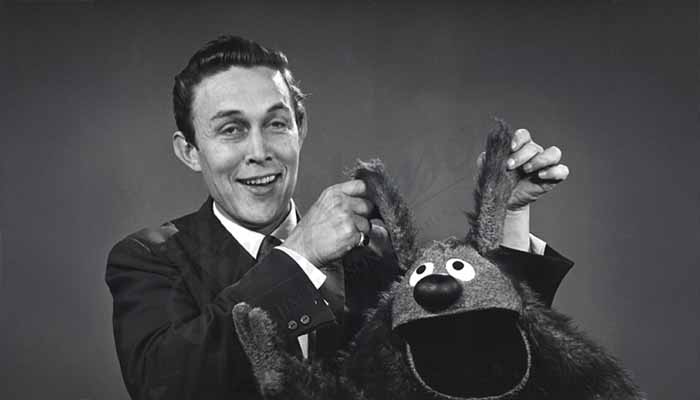
Forget the classic comedy duos for a moment. From 1963 to 1966, one of the most compelling and genuinely funny partnerships on television consisted of a man known for country ballads and breakfast meats, and a dog made of synthetic fur. The undeniable heart of Rowlf’s success lay in the chemistry between Jimmy Dean and the Muppet, performed primarily by Jim Henson with assistance from Frank Oz and later Jerry Nelson operating Rowlf’s right hand. This chemistry was described as “instantly electric”.
Crucially, Dean didn’t treat Rowlf as a prop. He engaged with the puppet as a genuine co-star, looking him in the eye and reacting with what appeared to be authentic amusement. Sources note that Dean would often break into spontaneous, genuine laughter during their segments, which, despite being scripted, lent them an air of improvisation and solidified the feeling of a real friendship unfolding on screen. Dean himself later reflected on this dynamic, stating, “I treated Rowlf like he was real, but he was real to me”. Even the crew sometimes forgot Henson was underneath the puppet, so vivid was the interaction.
This commitment from the human host was essential. By fully buying into Rowlf’s reality, Dean gave the audience permission to do the same. His natural reactions, especially his laughter, effectively dissolved the barrier between puppet and character, allowing viewers to connect with Rowlf emotionally and find the humor authentic. Without Dean’s wholehearted participation, Rowlf might have remained an amusing novelty rather than a beloved television personality. Adding another layer to their unique rapport was a charming quirk: Dean consistently pronounced Rowlf’s name as “Ralph”. It became an endearing feature of their interactions, like an inside joke between the host and his “ol’ buddy,” as Dean often introduced him.
Rowlf Unleashed: Greatest Hits from the Hound
Rowlf wasn’t just a furry face sitting beside Dean; he was an active participant, a performer in his own right. Each week featured a dedicated segment between Dean and his canine companion, often culminating in a musical duet. These sketches became highlights of the show, showcasing Rowlf’s burgeoning personality and the duo’s versatile dynamic.
The writers cleverly allowed the pair to swap comedic roles. Sometimes Dean played the straight man or mentor, while other times Rowlf took the lead, demonstrating surprising sophistication or world-weariness. This flexibility kept the segments fresh and allowed Rowlf to develop beyond a simple sidekick role.
Consider a sketch where Rowlf sought self-defense lessons to deal with a bullying bulldog. Dean initially took on the mentor role, even teasing Rowlf about being “a bit too flabby and out of shape” (early Rowlf puppets were indeed rounder). The comedic twist arrived with the revelation that the bully wasn’t Bobby the Bulldog, but Bobbie, short for Barbara. This prompted Dean to abruptly switch tactics from teaching fighting (at which Rowlf’s only effective move was biting) to offering dubious romance advice, reflecting the era’s sensibilities. The sketch even included a brief, cringeworthy moment of mock-Japanese karate, a reminder of the period’s less enlightened humor.
Another memorable sketch flipped the dynamic entirely. Dean claimed proficiency in jazz piano, but his attempt was described as so “extremely white” that it caused Rowlf to literally hold his head in his paws in despair. Rowlf then took over, schooling Dean on the proper way to play jazz piano – a skill that would become a character staple on The Muppet Show. He played first with both paws, then showed off using only one, quipping, “And a dog’s hand at that!”. Later in the same sketch, after Rowlf mused about hanging with “hep cats,” Dean laid on a thick guilt trip about how much he’d miss him. Rowlf, recognizing the tactic (“He does it to me every time”), declared he’d have to remain “Jimmy Dean’s dog.” When Dean asked him to play some country music, Rowlf touchingly replied, “You mean our kind of music,” blending humor and sweetness in a way that would become a Muppet trademark.
These examples illustrate a willingness to let the Muppet character be the more knowledgeable or capable figure at times. This departure from the typical human-dominant dynamic was quite progressive and crucial in establishing that Muppets could be characters with their own distinct skills and personalities, not merely foils for human performers. Video clips confirm their range, showing Rowlf and Dean singing their signature “Friendship” duet , Rowlf dealing with laryngitis only to get his sneeze back , celebrating Halloween and Christmas, complaining that the pop song “Hang On Sloopy” sucks , breaking guitars, hating cats, and even grappling with taxes.
America’s Most Wanted Mutt: Rowlf Fever!
Rowlf’s impact transcended mere likability; he became a genuine phenomenon. The show reportedly received an astonishing 2,000 fan letters per week specifically addressed to Rowlf. Consider that figure: two thousand letters weekly for a puppet dog in the mid-1960s. This wasn’t just passive viewing; it was active engagement on a massive scale.
His popularity grew so immense that it occasionally seemed poised to eclipse the show’s human star. A profile of Dean in TV Guide from July 1965 recounted an incident during a location shoot where crowds swarmed Jim Henson, prompting Dean to mutter, partly in jest, partly perhaps not, “Next thing you know, they’ll be calling the dog the star of this here ol’ show”. This anecdote vividly illustrates the magnitude of Rowlf’s appeal.
Naturally, this level of popularity attracted commercial interest. ABC and the Ideal Toy Company recognized the merchandising potential. Around 1965-1966, they launched a line of Muppet merchandise, prominently featuring “Professional Style Action Puppet” versions of Rowlf. Also included was a certain green frog named Kermit, who had been developed for an ultimately unproduced ABC pilot based on Cinderella. These toys, billed “As Seen On TV,” marked the beginning of Muppet merchandising, although the packaging amusingly misspelled Jim Henson’s name as “Hensen”.
Rowlf’s success on The Jimmy Dean Show proved pivotal for Henson’s burgeoning company. It provided the Muppets with their first sustained national exposure. More than just fame, the regular network gig offered a steady income stream. This financial stability, bolstered by related opportunities like commercials (Muppets, Inc. would create ads for over 50 companies in the following decade), allowed Henson to fund Muppets, Inc. and pursue more ambitious creative projects. In essence, Rowlf’s television stardom wasn’t just a creative breakthrough; it was the financial engine that helped power the Muppets’ future. His popularity provided the resources and reputation necessary to bridge the gap from niche puppetry to the large-scale productions like Sesame Street and The Muppet Show that were yet to come.
So Long, Ol’ Buddy: The Legacy of a Piano-Playing Pooch
The Jimmy Dean Show aired its final episode in April 1966, bringing Rowlf’s regular weekly appearances alongside his “ol’ buddy” Jimmy to a close. The partnership left an indelible mark on television history and on the trajectory of the Muppets.
One fascinating footnote speaks volumes about Rowlf’s perceived value and Henson’s gratitude. At some point, Henson offered Jimmy Dean a 40 percent stake in his company, Muppets, Inc.. Dean, in a move that seems astounding in hindsight, declined the offer. His reasoning, stated years later in 2005, was simple humility: “I didn’t do anything to earn that”. One can only imagine an alternate timeline where the Sausage King was also a Muppet mogul. Dean’s refusal, whether rooted in genuine modesty, a lack of foresight regarding Henson’s potential empire, or simply a view that facilitating Rowlf’s appearances was just part of his hosting duties, offers a revealing glimpse into the perception of puppetry’s business potential at the time. It underscores how revolutionary Henson’s vision was, as even someone witnessing its burgeoning success firsthand didn’t fully grasp the global phenomenon the Muppets would become.
Rowlf’s three-year run on the show was undeniably groundbreaking. He demonstrated conclusively that Muppets could be relatable, funny, and emotionally engaging characters capable of sustaining audience interest week after week on national television. He served as the prototype for Muppet-human interaction, proving that the dynamic worked best when the human performer fully committed to the Muppet’s reality. During his tenure, Rowlf evolved from a character primarily seen in commercials into a fully realized personality, developed live on air each week by Henson.
While Kermit the Frog would eventually emerge as the central figure and host of the Muppet universe, Rowlf was the original trailblazer. He was, effectively, the first Muppet celebrity. He charmed a nation, proved the concept, warmed up the audience, and demonstrated that characters made of felt and fur could not only share the screen with human stars but sometimes even steal the show. So, the next time you enjoy the antics of any Muppet, take a moment to remember the cool, laid-back, piano-playing dog who started it all, trading quips and songs with a country singer on Thursday nights back in the 60s. Thanks for the laughs, “Ralph.”

